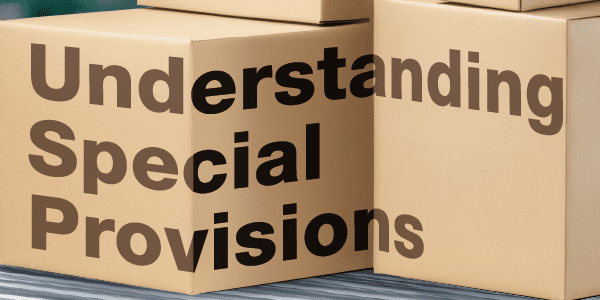Online shopping – whether from large internet companies such as Amazon, to individual vendors on sites such as eBay – has grown, well, explosively, in the past few years. But with this growth has come a headache for shippers, receivers and regulators. How do you handle online purchases of product that may actually be classified as dangerous goods (or, in the US, as hazardous materials)?
Often, people are not aware that common consumer products may be considered hazardous for transportation. These include:
-
- Aerosol sprays
- Cosmetics, such as nail polish remover or perfumes
- Flammable liquids, such as paints and adhesives
- Smoke detectors containing radioactive sources
- Fireworks
- Refrigerants (including those in equipment)
- Fire extinguishers
- Goods with internal combustion engines
- Lithium batteries, including batteries packed in or with electronic equipment
There are, of course, provisions in various regulations such as the US Hazardous Materials Regulations of 49 CFR (Title 49 of the Code of Federal Regulations), and Canada’s Transportation of Dangerous Goods (TDG) Regulations. Small packages of dangerous goods can often be shipped more easily under the provisions for Limited Quantities or Consumer Commodities. These provisions, however, do vary from country to country.
In addition, the regulations for shipment by air are much more stringent. Shipments by carriers who specialize in fast delivery may need to comply with the system for air transportation from ICAO (International Civil Aviation Organization), and IATA (International Air Transport Association). These may require additional packaging, labeling or paperwork, and in some cases will completely prohibit the transportation of goods that can be legally transported by ground.
If you plan on selling products online that may be considered dangerous goods or hazardous materials, here are some things you will need to do:
- Consult your national transportation regulations. These will identify what qualifies as dangerous goods, as well as any exemptions or special cases that you can use to reduce the regulatory burden when shipping them
- Consult with your carrier. Most national postal services will have restrictions on transport of dangerous goods, so simply boxing up those aerosol cans and popping them into the mail may be against the law. Here are some sources for information on typical carriers for online purchases:
- The United States Postal Service has an online guide to hazardous materials mailability rules at http://pe.usps.com/text/dmm300/601.htm#1064962
- Canada Post has guidance at www.canadapost.ca
- UPS addresses how to set up dangerous goods service at www.ups.com
- The FEDEX rules are given at www.fedex.com (Canada) and www.fedex.com (United States)
- If using the services of an online store such as eBay, consult their terms of service. eBay will allow some hazardous materials to be sold through their website, but only if the listing clearly describes the hazardous nature of the product, and specifies a shipping method that meets regulatory and postal service requirements
- International shipments require knowledge of other country’s regulations. Many countries will have restrictions or licensing requirements for various types of dangerous goods in addition to the actual transportation regulations. Do not assume that just because your national regulations permit a shipment, that the countries of transit or the receiving country will also do so
- Determine if the shipment will be cost-effective. It may be more money than it’s worth in extra shipping costs to ship, say, a small can of spray paint or spare lithium batteries with a larger shipment. Consider shipping without the hazardous components, and let the customer supply those at the other end
If you purchase dangerous goods online, some suggestions include:
- Only purchase from reputable suppliers, who indicate that they are aware of the regulations, and prepared to meet them
- Check your national regulations for any specific responsibilities that you will have to meet as a receiver (such as training), or government registration of materials such as explosives or radioactives
- Be aware of other regulations that may affect the shipment. For example, verify that the product is legal in your country, and meets applicable safety standards. (That great deal on white paint might just contain an unacceptable level of lead pigment in North America.)
- Be prepared for delays. That great deal on perfume may not arrive right on time for Valentine’s Day
The new online world has created many opportunities for retailers, both large and small. However, the regulations for transporting dangerous goods still apply, just as they have always done. Make sure that you take them into consideration before bidding on that “can’t miss” deal on your favourite shopping site.
If you have questions about transporting hazardous materials or dangerous goods, contact us here at ICC (1-888-442-9628 (USA) or 1-888-977-44834 (Canada)).





